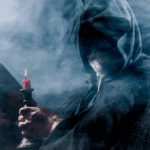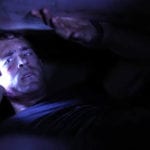 Mysteries
Mysteries  Mysteries
Mysteries  History
History 10 Surprising Stories About the Texas Rangers
 Humans
Humans 10 Philosophers Who Were Driven Mad by Their Own Theories
 Miscellaneous
Miscellaneous 10 Video-Game-Worthy Weapons and Armors from History
 Weird Stuff
Weird Stuff 10 Psychics Who Accurately Predicted Wartime Events
 The Arts
The Arts 10 Pieces of Art Inspired by a Broken Heart
 Health
Health 10 Science Fiction-Sounding New Medical Treatments
 History
History 10 Surprising Facts About the Father of Submarine Warfare
 Space
Space Ten Astonishing New Insights into Alien Worlds
 Weird Stuff
Weird Stuff 10 Bizarre Summer Solstice Rituals Still Practiced Today
 Mysteries
Mysteries Top 10 Haunting Facts About the Ghost Ship MV Alta
 History
History 10 Surprising Stories About the Texas Rangers
 Humans
Humans 10 Philosophers Who Were Driven Mad by Their Own Theories
Who's Behind Listverse?

Jamie Frater
Head Editor
Jamie founded Listverse due to an insatiable desire to share fascinating, obscure, and bizarre facts. He has been a guest speaker on numerous national radio and television stations and is a five time published author.
More About Us Miscellaneous
Miscellaneous 10 Video-Game-Worthy Weapons and Armors from History
 Weird Stuff
Weird Stuff 10 Psychics Who Accurately Predicted Wartime Events
 The Arts
The Arts 10 Pieces of Art Inspired by a Broken Heart
 Health
Health 10 Science Fiction-Sounding New Medical Treatments
 History
History 10 Surprising Facts About the Father of Submarine Warfare
 Space
Space Ten Astonishing New Insights into Alien Worlds
 Weird Stuff
Weird Stuff 10 Bizarre Summer Solstice Rituals Still Practiced Today
10 Must-Watch Films About Cults
Cults are a fascinating subject matter, perhaps because they tell us something about human psychology, interactions, and our need to belong to something bigger. Or maybe they fulfill our morbid curiosities? Either way, as far back as the 1930s, the film industry has looked to sects, communes, and secret societies as a source of inspiration for big-screen (and small screen) features.
Early on, such films tended to focus on satanic and occult groups, primarily drawing inspiration from fictional sources. Then, however, real-life started to seem stranger than fiction in the post-Manson-family and Peoples Temple world. And the ’70s and ’80s saw something of a boom in realist cult-featuring films. Today, movies about cults are going through a resurgence, often mixing fantasy and realist elements to subvert expectations.
Here we’ll be looking at ten of the all-time greatest films that feature cults from the classic era to the modern.
Related: 10 Former Cult Members And Their Chilling Stories
10 The Sacrement (2013)
This incredibly meta film sees A.J. Bowen and Joe Swansburg play two vice journalists documenting their co-worker Patrick’s (Kentucker Audley) attempt to infiltrate a commune and find his sister. Said commune puts up a friendly and cooperative front, but, as you might expect, allegations of abuse and brainwashing soon surface.
Basing its story on the Jonestown Massacre, The Sacrament certainly pushes the boundaries of good taste at times. As such, it’s not a film for everyone. But, those who can stomach it will find a movie that’s so dread-inducing they will likely struggle to look away. This “found footage” film is definitely one to watch.[1]
9 The Seventh Victim (1943)
The oldest film on this list and the first decent film to feature a cult, The Seventh Victim, is undeniably lightyears ahead of its time. The film sees a young woman named Mary (Kim Hunter) on the search for her missing sister Jaqueline (Jean Brooks) across New York City. Acquiring the help of one Dr. Louis Judd (Tom Conway), Mary soon uncovers a mysterious and sinister group of Satanists who may be behind her sister’s disappearance. It may sound like the beginning of a cliched flick, but it doesn’t play out as you might expect.
The Seventh Victim initially struggled at the box office and received mixed reviews. Such was probably not helped by the multiple cuts made during editing that rendered the narrative incoherent. Nonetheless, it has since become something of a cult classic, its obtuse story only adding to its appeal.
If you do check this one out, keep a lookout for the proto-psycho shower scene that even Hitchcock would have been proud to shoot.[2]
8 Midsommar (2019)
You knew this one would probably be on here somewhere, right? Ari Aster’s previous film, Hereditary, is just as good and also features a cult, but Midsommar’s take on the genre is more original and interesting in scope.
The film sees recently traumatized psychology student Dani (Florence Pugh) and her distant boyfriend Christian (Jack Reynor) head to a Swedish midsummer festival with a group of friends. There, bad trips, culture shocks, and a shocking conspiracy await.
The magic of Midsommar is how it turns the viewer so against the film’s less-likable characters that it “indoctrinates” them into the cult’s way of thinking. “That’s the trick we’re playing,” Aster once said during an interview. “there should be a perverse thrill… having this thing happen that maybe you want to happen… but it should also be troubling.”[3]
7 Sound of My Voice (2011)
Substitute schoolteacher Peter (Christopher Denham) and writer Lorna (Nichole Vicius) are a couple who have set about making an expose documentary on a secretive cult whose leader claims to be from the future. But when the couple manages to infiltrate the cult, they soon find themselves questioning what is real and what isn’t.
The Sound of My Voice was initially meant to be the first part of a trilogy. But unfortunately, no sequels have ever materialized. Regardless, this clever low-budget flick stands well enough on its own, opening up questions about faith, identity, and the psychological power of persuasion in the process.[4]
6 Martha Marcy May Marlene (2011)
Many films deal with how cults indoctrinate people, but only a handful look at what happens to the survivors. Fewer still handle the subject half as well as Martha Marcy May Marlene (say that five times fast).
The film follows Martha (Elisabeth Olson), a 22-year-old who has just escaped an abusive cult and is living with her sister Lucy (Sarah Paulson) and her sister’s husband Ted (Hugh Dancey) in their lakehouse home. There, she suffers from the psychological scars of her past and soon begins exhibiting strange behavior, leading to friction within the household.
Sidestepping the usually fantastical slants of other films for a more realistic one, Martha Marcy May Marlene may not be the most joyous of watches, but it is no less compelling. Critics also thought so, leading to the film taking home an award for best directing at the Sundance Film Festival[5]
5 Ticket to Heaven (1981)
Based on a nonfiction book by John Freed about his and his friend’s experiences with a cult, Ticket to Heaven is another film that opts for a more realistic approach to its subject matter. The result, however, is just as terrifying as any horror movie could ever be.
The film is about a young twenty-something schoolteacher named David (Nick Mancuso) who is brainwashed by a cult that uses sleep deprivation and starvation to mold its members into money-hustling disciples. David is soon left gaunt and mindless; his only hope lies in family and friends who plan to rescue and deprogram him.[6]
4 Cult (2019)
Described as an “endearing, amusing, and heartfelt feature debut,” this 2019 film finds laughs and humanity within a subject usually confined to the horror and thriller genres.
So what’s it about? Well, it’s another film about a documentary crew trying to make a movie about a cult. But, instead of a dark and crazed secret society, they uncover a group of oddballs and outcasts just looking for a place to call home. But unfortunately, something mysterious is going on with its elusive leader, and the group’s vulnerable members may be on a collision course with tragedy.
A comedy based around a suicide cult is undoubtedly a hard sell, but Cult is not the exploitive piece you might assume. Instead, we have a film with a heart of gold filled with characters that will ultimately endear themselves to you. That’s not to disregard its humor, though, which this film has in spades, from unusual song parodies to the cult’s bumbling attempts at recruiting and inducting new members.[7]
3 The Master (2012)
The Master sees Joaquin Phoenix as Freddie Quell, a WWII veteran struggling to adjust to post-war life. Depressed and prone to violence, Freddie soon finds himself recruited into a philosophical movement known as “The Cause.” There, Freddie does his best to follow the teaching of the group’s leader, Lancaster Dodd (Phillip Seymour Hoffman). However, he soon finds himself at odds with Dodd’s inner circle, who view him as a potential threat.
The Master is an unashamedly challenging film but an undeniably fascinating one too. If nothing else, it certainly went down well with critics, winning several awards and receiving several Oscar nominations. The film is relatively open to interpretation, and many have drawn comparisons between “The Cause” and the Church of Scientology. But, whatever you make of it, it’s a must-watch.[8]
2 Rosemary’s Baby (1968)
When a young and timid Catholic woman named Rosemary Woodhouse (Mia Farrow) moves into an old New York building with her husband Guy (John Cassavetes), the pair are befriended by their new obtusely welcoming and eccentric neighbors. But as Rosemary falls pregnant, alarming hints of a strange conspiracy against her begin to emerge, one that her husband appears to either not notice or be in on.
This 1960s horror classic is as suspenseful and terrifying as any film you’ll ever see. But Rosemary’s Baby initially seemed to be a doomed production. Scheduling problems and director Roman Polanski’s meticulous attention to detail meant the film went over budget and off schedule. Not helping matters was the hell that Mia Farrow went through to finish the feature. Not only did she have to walk into real incoming traffic to shoot one scene, but her husband Frank Sinatra would serve her divorce papers on set via his lawyer.
However, it would all seemingly be worth it in the end. Upon release, the film received critical acclaim, and supporting actress Ruth Gordon bagged a Golden Globe and Academy Award for her efforts. Later, in 2014, the film was selected for preservation in the national film registry by the Library of Congress.[9]
1 The Wicker Man (1973)
Once described as the “Citizen Kane of Horror,” The Wicker Man might be the greatest film about cults ever made. And, no, we’re not talking about that Nicolas Cage film with the bees.
The Wicker Man sees a deeply religious and conservative police Sergent, Neil Howie (Edward Woodward), head to a remote Scottish island searching for a missing girl. Unfortunately, he soon finds himself quite at odds with the local populace, who live a pagan lifestyle, seemingly dictated by the island’s owner, Lord Summerisle (Christopher Lee). Howie begins to believe that the girl may have been murdered as part of some ritual, and with May Day fast approaching, he races to uncover the truth before the islanders claim another victim.
The Wicker Man is another film that plays tricks on its audience, the unlikability of its protagonist blinding audiences to the deeds of the “quirky” islanders. Christopher Lee, who played the film’s antagonist, would actually go on record to call it his best movie, and who are we to argue?[10]








